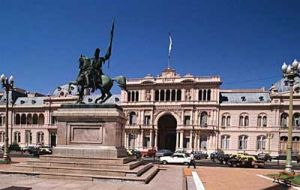MercoPress. South Atlantic News Agency
Specter of new default in Argentina “closer”, says FT
 “The Pink House”, Pte. Cristina Fernandez office at Bs. Aires
“The Pink House”, Pte. Cristina Fernandez office at Bs. Aires London's prestigious Financial Times has published a scathing report on Argentina's financial situation and the loss of confidence in the current government which it argues “has brought the specter of a new default closer”.
Under the title of "Argentine debt surge raises specter of default" the FT says that "Argentina's debt levels are now higher than they were when it crashed into the biggest sovereign debt default in history in 2001". Despite a radical restructuring just three years ago, public debt has reached 114.7 billion US dollars, or 56% of GDP, compared with 144.2 billion, or 54% of GDP, in 2001 at a time when Argentina's economy was much larger. The FT article is based on a report soon to be published from economists Martín Krause and Aldo Abram, directors of the Argentine Institutions and Markets Research Centre at Eseade business school. "If the amount owed to bondholders who did not accept the 2005 restructuring and are suing to recover their money is included, Argentina's overall debt rises to 170 billion, or 67% of GDP". "We're not teetering on the brink of default but if we continue down this path, with this level of [social] conflict, we could get there" according to Mr Abram. Many developed countries, including Italy and Japan, have higher ratios of debt to GDP but Argentina's higher borrowing costs and rocky institutional record make it harder to secure credit. "The worry is not the amount, it's that we won't have access to credit," Mr Abram said. The six-month-old government of President Cristina Fernández de Kirchner has been struggling to resolve a conflict with farmers after it imposed a sliding scale of export tariffs on key agricultural exports in March. The unrest has spread to truck drivers, who have mounted roadblocks to demand an end to the farm dispute, which has disrupted grains transportation. Their action has caused fuel shortages and will put further pressure on inflation, which the government is widely accused of trying to conceal with "creative accounting". But the fact is that the Kirchner administration must this year find 14.6 billion US dollars for debt servicing, plus 11.8 billion next year and 10.5 billion in 2010. Financial Times then points out that the threat of legal action by bond holdouts bars Argentina from international capital markets whilst it remains in default with the Paris Club of creditor nations, to which it owes 6.6 billion. Argentina has therefore increasingly turned to Venezuelan president Hugo Chávez, who has bought 6.4 billion in bonds in the past three years. "But its international financial isolation is costly – Buenos Aires has had to pay Venezuela interest rates of up to 13%, yet it cancelled its low-cost International Monetary Fund debt and the Paris Club debt only costs 5.3%, Mr Krause said". By contrast Brazil, which had a far worse debt profile than Argentina in 2001, recently achieved investment grade and sold a 10-year bond at 5.3%.




Top Comments
Disclaimer & comment rulesCommenting for this story is now closed.
If you have a Facebook account, become a fan and comment on our Facebook Page!